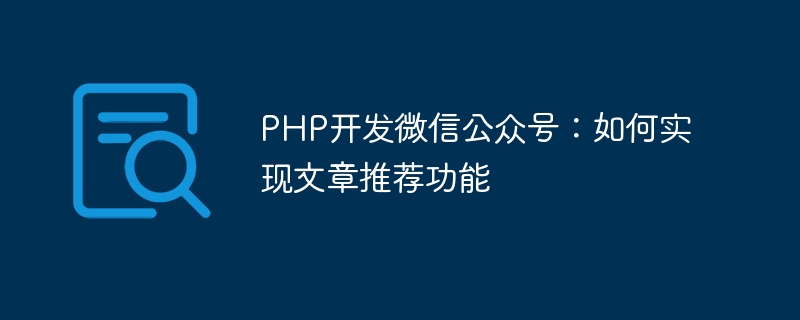Home >Backend Development >PHP Tutorial >PHP development of WeChat public account: how to implement article recommendation function
PHP development of WeChat public account: how to implement article recommendation function
- PHPzOriginal
- 2023-10-26 11:29:01944browse

Developing WeChat public accounts with PHP: How to implement the article recommendation function requires specific code examples
With the development of the mobile Internet, WeChat public accounts are gradually becoming more and more popular for enterprises and individuals An important platform for disseminating information. In order to increase user experience and attract more users, the article recommendation function of WeChat official accounts has become an indispensable part. This article will introduce how to use PHP to develop the article recommendation function of WeChat public accounts and provide specific code examples.
First of all, we need to clarify the idea of implementing the article recommendation function. The article recommendation function is generally implemented based on the user's reading habits and recommendation algorithms. In the WeChat public account, article recommendations can be made by recording the user's historical reading records and analyzing the user's interests and preferences. The following are the specific implementation steps:
- Get the user’s reading record
When the user clicks to open an article, we can obtain the user’s reading record through the interface provided by the WeChat official account, including the number of the article Title, author, reading time and other information. The specific code is as follows:
$access_token = 'your_access_token';
$openid = 'user_openid';
$url = "https://api.weixin.qq.com/datacube/getarticletotal?access_token={$access_token}";
$data = array(
'begin_date' => '2021-01-01',
'end_date' => '2021-01-31',
'openid' => $openid
);
$json_data = json_encode($data);
$options = array(
'http' => array(
'method' => 'POST',
'header' => 'Content-type: application/json',
'content' => $json_data
)
);
$context = stream_context_create($options);
$result = file_get_contents($url, false, $context);
$read_data = json_decode($result, true);
foreach ($read_data['list'] as $item) {
$title = $item['title'];
$author = $item['author'];
$read_time = $item['int_time'];
// 处理阅读记录,保存到数据库或其他存储方式
}- Analyze the user’s interest preferences
In order to achieve accurate article recommendation, we also need to analyze the user’s interest preferences. By analyzing the user's historical reading records and counting the types of articles and authors that the user often reads, we can infer the user's interests and preferences. The specific code is as follows:
// 从数据库中获取用户的历史阅读记录
$history_records = get_user_history_records($openid);
// 统计用户经常阅读的文章类型
$article_types = array();
foreach ($history_records as $record) {
$type = $record['type'];
if (isset($article_types[$type])) {
$article_types[$type] += 1;
} else {
$article_types[$type] = 1;
}
}
// 排序文章类型,取兴趣最高的几个作为推荐依据
arsort($article_types);
$interest_types = array_keys($article_types);
// 推荐文章,可以从数据库中取出与用户兴趣类型相关的文章列表
$recommend_articles = get_recommend_articles($interest_types);
// 输出推荐文章
foreach ($recommend_articles as $article) {
$title = $article['title'];
$author = $article['author'];
$content = $article['content'];
// 输出推荐文章的标题、作者等信息
}- Send recommended articles to users
The last step is to send recommended articles to users. This can be achieved through the template message function of the WeChat official account. The specific code is as follows:
$template_data = array(
'touser' => $openid,
'template_id' => 'your_template_id',
'data' => array(
'title' => array(
'value' => $title,
'color' => '#173177'
),
'author' => array(
'value' => $author,
'color' => '#173177'
),
'content' => array(
'value' => $content,
'color' => '#173177'
)
)
);
$template_url = "https://api.weixin.qq.com/cgi-bin/message/template/send?access_token={$access_token}";
$options = array(
'http' => array(
'method' => 'POST',
'header' => 'Content-type: application/json',
'content' => json_encode($template_data)
)
);
$context = stream_context_create($options);
$result = file_get_contents($template_url, false, $context);Through the above steps, we can implement the article recommendation function of the WeChat official account. When a user reads an article, we can record the user's reading history, analyze the user's interests and preferences, and send recommended articles to the user.
It should be noted that the above code only provides the basic ideas and sample code for implementing the article recommendation function. The specific implementation needs to be adjusted and expanded according to your own business needs. I hope this article can provide some reference for developing the article recommendation function of WeChat public accounts.
Summary:
This article introduces how to use PHP to develop the article recommendation function of WeChat public accounts, and provides specific code examples. By recording the user's reading history and analyzing the user's interests and preferences, we can implement the article recommendation function and send the recommended articles to the user. The article recommendation function can improve user experience and increase user stickiness, which is very important for the development of WeChat public accounts.
The above is the detailed content of PHP development of WeChat public account: how to implement article recommendation function. For more information, please follow other related articles on the PHP Chinese website!
Related articles
See more- 10 recommended articles about payment development
- 10 recommended articles about mini program examples
- Share the WeChat public account to realize the function of receiving membership cards
- WeChat public account development to implement a countdown function (pure code)
- How to create a WeChat public account

